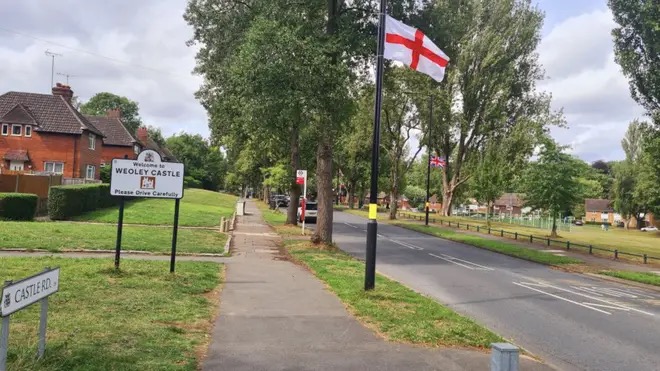Activists paint St George’s Cross on Birmingham roundabouts after Tower Hamlets and Birmingham councils tear down ‘unauthorised’ patriotic displays
Communities across Britain are defying council bans by hanging hundreds of Union Jack and St George’s flags on lampposts in a movement that has sparked accusations of “two-tier” treatment after Palestinian flags flew unchallenged for months.
The ‘Operation Raise the Colours’ campaign, which began in east London and Birmingham, has now spread to Manchester, Bradford, Newcastle, Norwich and the Isle of Wight, with activists using Facebook to coordinate flag-raising efforts and even painting St George’s crosses on roundabouts.
Tower Hamlets Council in east London and Birmingham City Council have both ordered the removal of the flags, citing safety concerns and unauthorised attachments to council infrastructure. However, critics have pointed out that Palestinian flags were displayed across Tower Hamlets for months following the Israel-Hamas conflict without intervention.
Shadow Home Secretary Chris Philp condemned what he called a “two-tier policy”, stating: “The Union Flag and St George’s Cross are part of our national identity. Displaying these flags shouldn’t just be allowed – it should be encouraged, and they should fly with pride.”
He added: “Councils like Birmingham and Tower Hamlets allowed flags of other countries to be displayed for weeks or months. But at the first sign of our national flags and they come straight down. More two tier policy. It is simply wrong.”
Sir Keir Starmer has backed residents putting up English flags, with his spokesman saying the Prime Minister “absolutely” supports the practice. Asked about the controversy, the PM’s spokesman said: “I think the PM has always talked about his pride in being British, the patriotism he feels.”
We put up English flags all around Downing Street every time the English football team, women’s and men’s are out, trying to win games for us,” the spokesman added, though the PM stopped short of commenting on individual council decisions.
The movement has gained momentum through a Facebook page where members coordinate transport and equipment, including ladders. One user posted: “60 of the 120 just collected… going to be a busy few evenings.” Another wrote: “I just feel that the time has come to all band together and refuse to be bullied, we are proud of our country and should not be made to feel otherwise.”
In Birmingham, angry residents have escalated their response by painting St George’s crosses on mini-roundabouts in Kings Heath and Yardley Wood after the council removed approximately 200 flags from lampposts. The Union Jack and St George’s flags had been raised by a group called the Weoley Warriors, funded by £2,500 in public donations.
Birmingham City Council claimed the “unauthorised items” were “dangerous” and could potentially kill motorists and pedestrians, stating that the extra weight could “potentially lead to collapse” of structures. The council said: “Lampposts are engineered for their specific purpose, and adding extra weight or stress from flags and attachments can cause them to weaken over time.
Tower Hamlets Mayor Lutfur Rahman, who was found guilty of electoral fraud in 2015, has attempted to thwart the campaign. A council spokesperson said: “While we recognise people wish to express their views, we have a responsibility to monitor and maintain council infrastructure. Where flags are attached to council-owned infrastructure without permission, they may be removed as part of routine maintenance.”
Shadow Justice Secretary Robert Jenrick accused Tower Hamlets of hypocrisy, stating: “Tower Hamlets council have allowed Palestinian flags to be publicly displayed on lampposts but not the flag of our country. This absurd national self-loathing must end. This is yet more two-tier bias against the British people. We must be one country united under the Union flag.”
Former Conservative leader Sir Iain Duncan Smith questioned the selective enforcement: “Why would we leave [Palestinian flags] up and take down flags that represent one of the countries of the UK?”
The Palestinian flags had flown across Tower Hamlets for months before being removed in March 2024, and only after UK Lawyers for Israel argued that displaying them constituted criminal offences. Jewish families had complained the flags were “oppressive and intimidating” and made them feel unwelcome.
Former Home Secretary Suella Braverman called the national flag “a great source of pride and patriotism” which “should be flown from as many places as possible as often as possible.
Residents in Tower Hamlets’ Manchester Road reported seeing streets lined with St George’s flags over the weekend, though most had been removed by Monday. One local said: “They were all along the street, lots of them. It looked nice really. It was very colourful.”
Another resident added it was “good to see” because “so much today is about division and I am just proud of being English.”
Group members have vowed to redouble their efforts and rejected claims the movement is “aggressive”. According to government guidance published in 2021, “flags are a very British way of expressing joy and pride.”
Birmingham City Council’s Conservative leader Robert Alden said: “Our national flags are nothing to be ashamed of. Seeing our flags flying gives us all pride in our shared history and achievements as a great nation.”
The controversy comes at a time of heightened tensions over national identity and perceived double standards in how different communities are treated by authorities. While councils cite health and safety concerns, the rapid removal of British flags compared to the lengthy display of other nations’ flags has fuelled accusations of bias.
As the movement continues to spread across the country, activists show no signs of backing down, with many viewing the flag displays as a peaceful expression of national pride and a stand against what they see as unfair treatment by local authorities.
Follow for more updates on Britannia Daily



